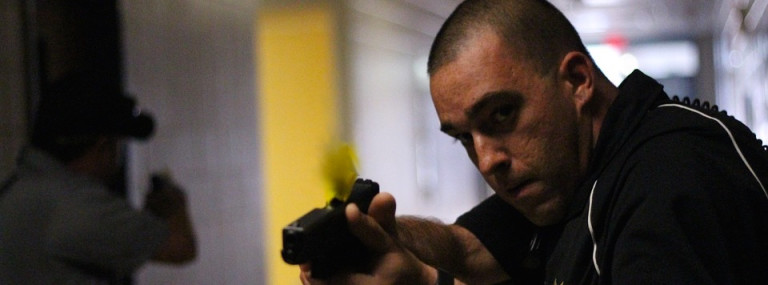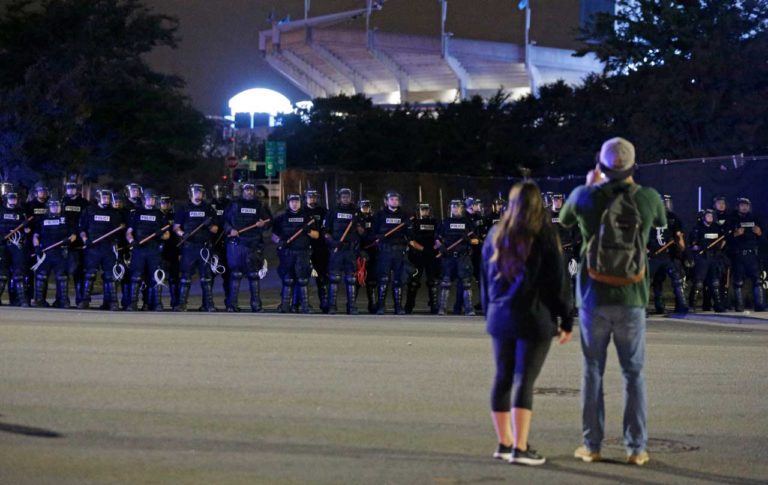Rehearsed Response Can Save a Life

Predator: Lee M., former Special Forces Operator in Tennessee
Discussion: A rehearsed response can help save a life when you’re confronted with a crisis. Take the Fort Lauderdale airport shooting. First reports are that the suspect checked his weapon in his luggage, retrieved the gun in a bathroom in baggage claim, and set out to turn the arrivals area into a permanent departure zone.
Ask yourself this: If you had been there, would you have known what to do?
Not many people would guess a guy could retrieve a gun from his checked luggage. But some may have taken a few glances around the crowded airport as they passed through. Airports are favorite targets for terrorists and madmen. They offer the perfect venue for psycho target practice – lots of people in a confined space.
When Lee is in an airport, he cases the place. He identifies exits, places of shelter and other pieces of information that can help in a crisis. Lee spent years doing rehearsed response exercise drills in the military so he could respond at the first sign of danger.
Rehearsed Response in Action
Lee says every situation he’s been in had a different wrinkle. The best way to stay safe is by identifying potential threats, figuring out how to respond before a crisis occurs and improvising against curveballs as they come at you. That approach worked pretty well for Lee in Yemen. It worked just as well when a mugger pulled a knife on him recently in Atlanta.
Lee swears by Escape the Wolf’s THREAT™ matrix to help prepare for a boatload of unknown adversaries, obstacles or situations that might take you by surprise. This easy-to-remember acronym can help you identify, research, develop scenarios and respond effectively when dealing with all sorts of bad stuff.
Some threats are completely avoidable with proper preparation. Others can be countered by adapting to the situation with calm, educated reactions or decisions. A large number of threats can be neutralized through proper presentation, projection and demeanor.
Of course, some threats are unavoidable and will take you by surprise no matter how prepared you are. But by practicing good awareness of your own actions and presentation (Personal Awareness) and awareness of the situation (Situational Awareness), you can reduce those surprises dramatically.
The THREAT acronym breaks down into specific threats:
Technological Threats
Technological threats include the collection of information, often illegally, through audio collection devices, video collection devices, tracking devices, and cell phone, RFID passport, tablet and laptop exploitation. Bad guys use this information for profit, to attack you or to gather intelligence either for business or personal purposes. Protect your electronics. Create strong passwords. Change them often. Don’t use the same one for everything.
Health Threats
Health threats can confront you at home or when you travel. They include viruses, diseases, harmful bacteria, chemicals, and insect and animal bites.
Don’t wait until you have a temperature of 105. Get a flu vaccination every year. That worldwide flu epidemic of 1918 could happen again. There are all types of fun flu varieties – like avian, H1N1 and others – floating around ready to morph into the next killer pandemic.
Know the precautions to take and immunizations you’ll need, especially when traveling. Know what to eat, and what NOT to eat. Identify poisonous reptiles, insects and any other animals that could pose a threat in specific locations. In addition, travelers should be aware of road safety, as vehicle accidents are a major cause of injury and death worldwide. Yep, India and Africa, I’m talking to you.
Raids and Robbery
These types of threats run the gamut from pickpockets to kidnappers to murderers. Make sure you know what’s happening in your neighborhood. It helps to keep an eye on social media. Join a group like Nextdoor, where neighbors post alerts about recent crimes. Before traveling, conduct research to identify high-risk areas and the most common types of crimes.
Environmental Threats
Environmental threats include natural events like hurricanes, earthquakes, tsunamis, winter storms, volcanic eruptions and mudslides. Keep an eye on your local weather. TV is great, but Twitter can be even better for some emergency situations.
Get an emergency alert radio to monitor the weather, preferably a dual powered one with a wind-up lever that can recharge the batteries if the power goes out. If you’re traveling, make sure you research all potential environmental hazards and are prepared before your arrival. (Editor’s note: Interesting information on the U.S. Govt. emergency alert system here, and some history here.)
Agencies
Agency threats include government-sponsored groups, such as law enforcement agencies, espionage or other organizations. Now, we haven’t heard of any agencies doing anything nefarious recently, but that doesn’t mean that they aren’t. Certain intelligence and law enforcement agencies are devoted to collecting information, so be careful, especially if you are traveling overseas. They may be simply looking out for you, or they may be interested in competitive intelligence for their own government, or they may be trying to recruit you for government espionage.
Terrorism
Terrorist threats are rare, but they do happen. Not just overseas, but also in the United States. Terrorist groups may advocate violence in the name of everything from religious to environmental causes. Research active groups, tactics and locations around you and any intended travel destinations.
Lee urges you to take the time to research possible threats ahead of time. Start by writing THREAT vertically on a sheet of paper. If you are traveling, look up your destination country online. Then, begin filling in the blanks. Open source information is available on a number of great government websites, including the Centers for Disease Control and Prevention (CDC), FEMA, Homeland Security, the State Department, the CIA World Factbook and the Federal Trade Commission.
Now that you have done the research, put it into action with rehearsed response. Go through scenarios in your mind. What might happen? Go from the most likely to really far-fetched ideas. Even the most ridiculous thoughts can help bring to mind an important aspect you might otherwise have forgotten.
Lee goes through this preparation regularly. He’s prepared for most anything, whether he’s visiting a mall, an airport or just playing with his really germy kids.
Are you ready?
More to Follow!
(Featured Image Courtesy: VOANews.com)




